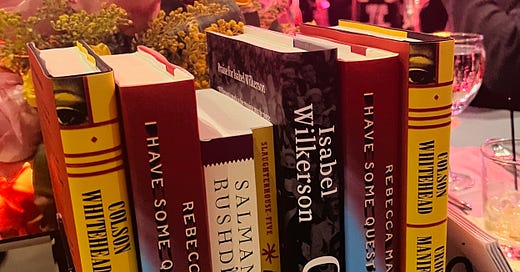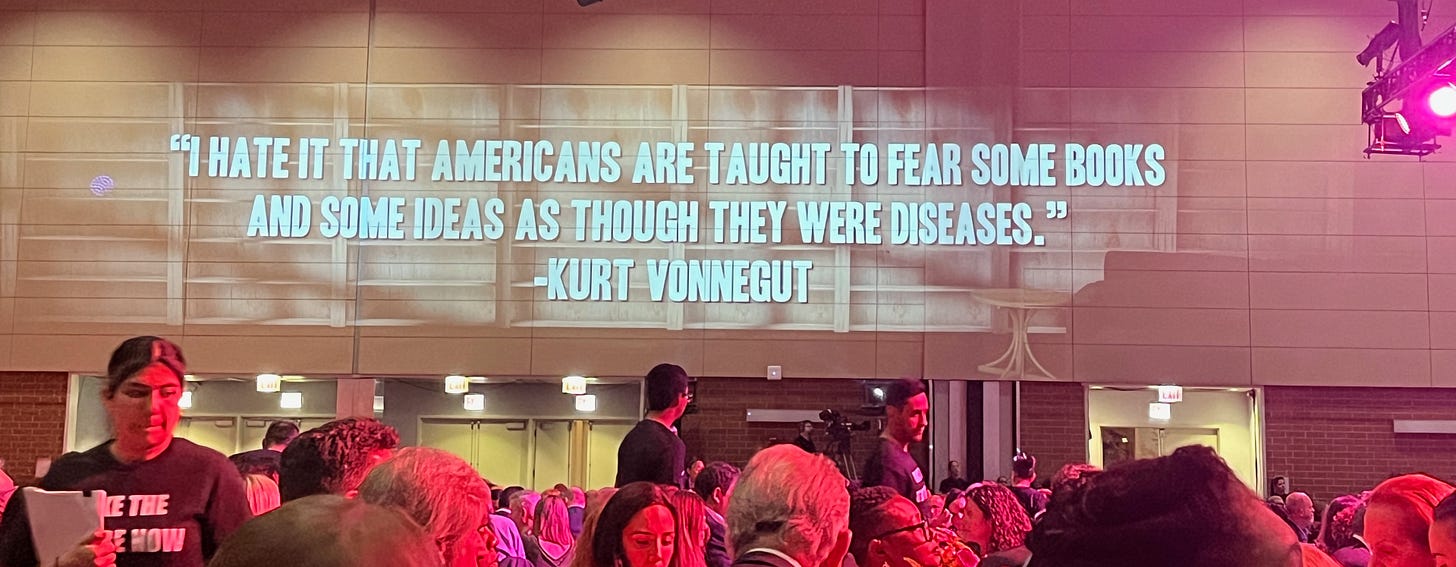On nearly 100 dinner tables at the 2023 Chicago Library Foundation’s Carl Sandburg Literary Awards, foundation staff had placed several copies of books that have been banned over the years—The Color Purple, Slaughter House Five, The Satanic Verses. There were many others, of course.There could have been thousands on those tables, banned books falling to the floor from the weight of their words. The books were free for guests to take home and read, and to wave into the night sky as they left that evening as a kind of protest to the current war on books. It was the theme of the night—the belief that the freedom to express ideas must remain and art must stand for something in troubled times.
I had been invited to the event as a recognized author. I was more than honored. But most of all, I was moved that night by the speeches from many, including the novelist Rebecca Makkai, reminding us how easily the First Amendment can be manipulated and attacked, and especially in troubled times—horrific events in the Middle East, the continuing atrocities in Ukraine, migrants fleeing violence and oppression and searching for homes, political divisiveness that undermines democracy, gun violence, and yes, attacks on one of our most American of institutions—the library.
How can art be part of the answer?
The Pulitzer Prize winning author, Colson Whitehead was the recipient of this year’s Carl Sandburg Award and he was asked in a live on-stage interview, how art—short stories and novels—fit into today’s dark world. I cannot recall his exact words, nor do I have access to his quotes, but I will try to paraphrase the best I can.
Whitehead said that we have come through much in America—and each time art wins. During many of the past’s most disturbing times—especially, he said, during the Communist scare of the 1950s and today when libraries are under attack—art has pressed on. During the Civil Rights movement, Vietnam, the AIDS crisis, 9-11, and on and on. In each of these times, art, and especially literature, was severely scrutinized simply because it offered ideas—sometimes unpopular, sometimes radical, sometimes taboo—that allowed readers to “think for themselves.” So, even in the darkest of days we all must believe, he said, that art will win again when we arrive on the other side of these bleak times.
Artists want to create work that speaks to others, and this can only be accomplished if it addresses people's most human needs and wants. In troubled times, people are not looking for escape, they are looking for understanding. Art, especially literature can do that. It must. We cannot allow those who fear ideas to win. Or as Stephen King said, “As a nation, we’ve been through too many fights to preserve our rights of free thought to let them go just because some prude with a highlighter doesn’t approve of them.”
Radhika Jones, the Editor-in-Chief of Vanity Fair wrote that “Art is formed in a crucible, and in times of political and cultural stress it’s wise to look to our visionaries, those with the capacity to imagine the world differently, to recast its characters or change its palette. It’s not about chasing escape but about opening the mind to what’s possible.”
Art allows us to experience new encounters. New encounters produce ideas. Ideas open our minds to change, understanding, and compassion. And so, give us art, all we can create, because as author Jon Krakauer wrote, “There is no greater joy than to have an endlessly changing horizon, for each day to have a new and different sun.” And that means new art, new books, new sculptures, new paintings, new music to present new possibilities for understanding each other.
All during the evening of the event, quotes from authors and artist on the necessary fight for the free flow of ideas were projected across a large screen. After all the awards and the speeches, my wife and I stood from our table to exit the event. On the screen. screaming out to hundreds of attendees were the words of one of America’s great writers . . .
And that’s exactly what is behind all attacks on free speech and specifically books. Fear. Fear of people who aren’t like us, fear of something new, fear of our own shame. Face those who fear. Show them the way.






Another great essay!